- Home
- Richard Lee Byers
The Reaver Page 9
The Reaver Read online
Page 9
“I’m sorry,” the servant said.
“It’s all right,” Stedd answered. Talking made his tongue hurt as much as the places the whip had struck, and his voice was thick. He tried to spit away the coppery taste of blood.
“I didn’t know,” the man persisted.
“Hardly anybody does. Spread the word. Tell people Lathander’s come back, and he’ll help us if we take care of each another, too.” Stedd stumbled as his legs threatened to give way beneath him.
The man with the whip caught him by the arm. “I did hurt you!”
“It’s not that,” said Stedd. He gave the man what he hoped was a reassuring smile. “Praying that hard just pulled the strength out of me.”
“Sit.” The servant hoisted him onto the pushcart, and people gathered expectantly around.
That meant that much as he would have liked to, Stedd couldn’t just relax and recover. He needed to reiterate the Morninglord’s message now that they were ready to receive it. He even healed the folk worst injured in the brawl, although that drained every last iota of his mystical strength and attenuated his feeling of closeness to his god.
As it did, his anxiety returned. He supposed that Anton alone couldn’t snatch him from this crowd of well-wishers, but what if the pirate showed up at the head of a gang of toughs, or what if waveservants and their knavish-looking followers appeared? Could the ordinary folk who were Stedd’s new friends stand up to them, or would they simply get hurt or killed trying? He didn’t want to be the cause of that.
But he was also reluctant to scuttle off in an obvious display of fear that might undermine the hope he’d just kindled in their hearts. He was still trying to think of a graceful way to take his leave when five men-at-arms tramped into the marketplace. Each wore a blue surcoat embroidered with a yellow sun and carried a round shield bearing the same device. The maces in their gauntleted hands had blue-stained handles and yellow-enameled spiky heads.
Their leader was a tall man in his middle years with a dangling black moustache that reminded Stedd of a horseshoe. He smiled and nodded his thanks as he approached the pushcart and folk cleared a path for him and his men.
“My name is Niseus Zoporos,” he said, “and I serve the temple of Amaunator. The priests sent me because word reached them that a boy drew down the light of the sun to do something wonderful. Is that boy you, young Saer?”
“Yes,” said Stedd, thinking for an instant how odd it felt for someone to address him like he was the son of a nobleman. But of course, that bit of deference didn’t matter.
What did matter was that Amaunator, the Keeper of the Yellow Sun, and Lathander were the same deity, give or take. To the extent that Stedd understood it, Amaunator, the celestial timekeeper, was the role the god assumed when the universe required a force for stability above all else. Now that that era was passing, and the need for hope and new beginnings was paramount, he was becoming the Morninglord once more.
Given that they all served the same power, surely the sunlords would help Stedd on his way. They’d be true friends and allies, like the Moonstars.
“My master asks that you come to the House of the Sun,” Niseus said. “He says the two of you clearly have much to discuss. To that I would add that whether you know it or not, you aren’t safe on the streets, not even in the midst of these good people.”
“I do know it.” Stedd hopped down off the pushcart. His welts gave him another twinge, but at least he’d recovered enough of his physical vigor that nobody needed to hold him up. “Please, take me there.”
CHAPTER FIVE
UMARA KEPT IMAGINING HER WIG WAS ASKEW, BUT PROBABLY, WITH her cowl up, it didn’t matter even if it was. It was likely better to leave it alone than to risk somebody noticing her fussing with it.
The wig was only part of her disguise. A stain covered the tattooing on her hands and neck, and she’d exchanged her red robes for nondescript garments of brown and tan. Nothing marked her as a wizard of Thay.
The drawback to that was that she wasn’t intimidating. No one in the crowd gathered before the temple of Amaunator with its huge sundial—a rather pathetic monument in a city where the sun never pierced the clouds—cleared a path for her. She had to twist and squirm her way closer to the twelve steps leading up to the four arched golden doors.
So far, it was a waste of effort. She wasn’t observing anything she hadn’t already noticed from the periphery of the throng. But she was enjoying Kymas’s discomfort. Like the firewalkers of Kossuth and the doomguides of Kelemvor, the sunlords of Amaunator were staunch foes of the undead, and even when the vampire was merely a psychic passenger peering through Umara’s eyes, it pained him a little to approach their consecrated stronghold.
In a murky sort of way, she could even sense Kymas resisting the urge to order her to retreat lest he appear weak. Taking care to mask her own thoughts, she smiled at his predicament, and then one of the golden doors opened.
People caught their breaths and craned for a better view, but groaned and slumped with disappointment when a grown woman in gold and blue came out.
She raised her hands for silence. “We of the temple understand why you’re here,” she called. “You want to see the boy from the marketplace. But he’s conferring with the hierophant, and after that, he’ll need to rest. So there’s no point standing in the rain. Go home. We hope the lad can speak to you tomorrow.”
Some folk shouted angry retorts. Ignoring them, the sunlady gave the crowd a perfunctory blessing by sweeping her hand through an arc, then went back inside. Afterward, some people did indeed turn to leave, but others stubbornly stayed put.
Very good, said Kymas, conversing mind to mind. That verifies the rumor. The Chosen is in the temple. We’ve caught up with him at last.
And all it took, Umara reflected, was working six oarsmen to death, whereupon the senior wizard turned the corpses into zombies and made them row some more. She told herself the end justified the means, but something about it was still distasteful.
What do we do now? she asked.
We go in and fetch him, of course. Well, to be precise, you do. I’ll meet you as soon as you exit, and we’ll take him to the galley together.
With a twinge of sardonic amusement, she supposed the dangerous solo task was her just reward for secretly laughing at her superior’s inability to tread on sacred ground.
Hundreds of years old—it had begun life as Morningstar Haven, a house of worship devoted to Lathander—the temple of Amaunator was a treasure trove of stained glass windows and skylights. Of late, Niseus Zoporos rarely noticed them without experiencing a pang of sadness at the memory of how brightly they once shined.
Perhaps they were the reason he heard the start of the chanting despite the thick stone walls: “Show us the boy! Show us the boy! Show us the boy!”
A small man with a balding crown and bushy gray eyebrows, Randal Sweetgrove, First Sunlord of Westgate, sat with his collection of sundials, hourglasses, calendar stones, shadow clocks, candle clocks, and dripping clepsydras arrayed behind him. He’d been smiling at Stedd, who was sitting on the other side of his desk, but he scowled at the noise from outside. “I thought I told Miri to send those people home.”
“She tried,” Niseus said from his station by the door. “Some went. Some didn’t.”
“I can talk to them,” said Stedd, meanwhile beginning the process of squirming out of an ornate chair that was rather too deep for him. “I feel better now, and the waveservants won’t be able to get me with Sir Niseus and the other guards protecting me.”
“Please, rest,” Randal said. “There’ll be time for speeches later.”
“But I told you,” said the boy as he completed the process of planting his feet on the floor, “I have to deliver Lathander’s message and keep traveling toward Sapra. So really, I shouldn’t waste time.”
“Sit back down!” the sunlord snapped.
Stedd didn’t resume his seat, but he did falter in surprise.
“I�
�m not your enemy, son,” Randal continued, “quite the contrary, and sitting here talking to you, I’ve weighed your words carefully in the hope of discovering that your notions aren’t heretical after all, just awkwardly expressed.”
Stedd shook his head. “Heretical?”
“Yes, and to my regret, after giving them a fair hearing, I can interpret them no other way. The sun god didn’t change from one incarnation to another only to revert to his previous persona a mere century later. The cycle takes millennia. It always has and always will. It can never vary because it reflects the order Amaunator embodies above all else.”
“You’re wrong,” said the boy. “Lathander came back because we need him.”
“Lad, I started my priestly training when I was as young as you are now. I’ve spent forty-five years contemplating the mysteries. Don’t you see how foolish, how insolent it is to claim you understand them better than I do?”
“I understand how it could seem that way,” Stedd replied with bitter disappointment in his voice, “and if it makes you angry, I’m sorry. But I still have to do what Lathander wants. I thought you’d help me, but if you don’t want to, I’ll go.”
“Niseus,” said the sunlord, “block the door.”
To thwart and intimidate a mere child who’d come here willingly at a temple knight’s invitation? It seemed like dishonorable behavior to say the least. But Niseus had sworn an oath of obedience, and he sidestepped to place himself in front of the exit.
“Let me out!” said Stedd.
“It will be all right,” Niseus replied. He hoped that was true.
Stedd pivoted and evidently spotted the smaller door in the back wall amid all the water clocks and such. He started to scramble around Randal’s desk.
The First Sunlord rattled off an invocation and swept his hand through the arc that symbolized the sun’s daily passage across the sky. Stedd’s muscles clenched into rigid immobility, and he pitched off balance and fell.
Randal looked to Niseus. “The paralysis won’t last long,” the high priest said. “Put the boy where he can’t get up to mischief. Lock him up with his hands tied and his mouth gagged.”
As predicted, Stedd’s muscles unlocked before Niseus finished securing him, but the boy didn’t offer any resistance. He plainly possessed his share of courage, but even so, this unexpected reversal, arriving just when he imagined he’d found friends and sanctuary, had hammered the fight out of him.
Niseus tramped back through the temple to Randal’s study. “It’s done.”
The sunlord sighed. “I take it you disapprove.”
“Explain why it was necessary.”
“Where to begin … with the obvious, I suppose. Do you think the boy’s right about our god, and I’m wrong?”
“Of course not, Saer. But if you’d seen the piles of vegetables in the marketplace and the way all the people were looking at him—”
“Creating food out of thin air is fairly basic clerical magic. If you recall, you’ve seen me do it.”
I never saw you create that much, Niseus thought, but his instincts warned him that saying so would only irritate his superior. “Then are you saying the boy really is channeling the divine?”
“He’s made contact with something. It isn’t necessarily the god we worship, and even if it is, that doesn’t mean he isn’t confused about the nature of what he’s experiencing. The higher powers are mysterious. If they weren’t, the world wouldn’t need priests.”
Niseus frowned. “All right. I see that. But does it mean we had to deal with him so harshly?”
“Considering that he refused to cooperate, yes. We live in harsh times, and a time when people can’t even see the sun. Do you think we can afford to let some illiterate farm boy wander around preaching nonsense and possibly produce a full-blown schism among the faithful?”
“I suppose not. But what do we do instead? Keep him here and teach him to believe what he ought to believe? Train him to be a true sunlord?”
Randal grimaced. “That could be seen as the waste of an opportunity.”
Niseus felt a pang of foreboding. “How so?”
“The church of Umberlee is becoming far and away the most powerful faith in Westgate. You and I can wish it were otherwise, but wishing won’t change the reality. The day may soon come when the prosperity, the dignity, indeed, the very survival of other temples depends on reaching an accommodation with Whitecap Hall.”
“And now you have something the waveservants want.”
“Judging from all the sniffing around they and their agents have done of late, they want him quite a lot. Enough, I hope, to guarantee tolerance for the House of the Sun in exchange.”
“You had this in the back of your mind from the start, didn’t you? Why didn’t you tell me before you sent me out to fetch the boy?”
“I didn’t want to take the time lest he disappear before you reached him. And, I confess, I hesitated to burden you with knowledge you’d find distasteful even though I knew the moment would arrive soon enough.”
“ ‘Distasteful’ is a mild word for it.”
“Believe me, I know. But we’ll be sacrificing a single troublemaker for the greater good. For the life of the church to which you and I have both given our lives. Can I count on you to stand by me as I carry it through?”
Niseus took a breath. “I’m your faithful servant, First Sunlord, the same as I’ve always been.”
“You’re my friend, Sir Knight, and for that, I will always be grateful.” Randal picked up a quill. “I’ll send a missive to the shark lovers informing them we have the boy, and then we can open negotiations.”
Anton had asked Dalabrac to procure a new saber for him, and the halfling had delivered a weapon that exceeded his expectations, exceptionally sharp and well balanced and with a subtle glimmer of enchantment in the curved steel of the blade. But wearing a sword on both hips, the saber on one and the cutlass on the other, made it harder to conceal the weapons under his new yellow mantle, or at least he suspected that was the case. He flipped the wings of the garment outward in the hope of eliminating telltale bulges.
Clad in his own sunlord disguise, Dalabrac looked up at him. “You keep doing that. Are you nervous?”
“All but petrified,” Anton answered drily. “Yourself?”
The Fire Knife grinned. “The same. Mind you, I wasn’t quite counting on a crowd of our young prophet’s admirers loitering in front of the temple. But if we collect him without raising a commotion and haul him out the same way we’re going in, it shouldn’t pose a problem.”
“Then let’s get to it,” Anton said. They’d waited long enough that, with any sort of luck at all, most of those who resided in the House of the Sun should already be in bed.
But as he, Dalabrac, and two other similarly disguised Fire Knives emerged from their lurking place behind an adjacent building and headed up an alley toward the rear of the temple, he realized Tymora might not be smiling in his direction tonight. Lightning flared, and the flash illuminated two men-at-arms guarding the unassuming back door.
Thunder boomed as Anton and his companions faltered. When the echoing crash subsided, the pirate said, “You neglected to mention guards.”
“They aren’t usually there,” Dalabrac replied. “The boy must have convinced the sun priests that someone might try to abduct him.”
“How right he was,” Anton said. “Well, I suppose this is where we put our mummery to the test. Everyone, keep moving before it registers on the guards that we balked.”
They did, and made it within several paces of the temple guards before the next blaze of lightning. The warriors, bundled up in their cloaks against the rain, goggled and lifted their maces. Evidently the wavering light had revealed the newcomers’ vestments for the hastily created counterfeits they were.
The man-at-arms on the left shouted, but another peal of thunder drowned out the sound. Anton snatched out his saber, charged, parried a mace strike, and cut down the sentry before the
echoes died.
At once, he pivoted to engage the other guard, but there was no need. The warrior already lay crumpled on the ground.
Dalabrac slipped a blowpipe back into his sleeve. “That was unfortunate.”
“Yes,” Anton said. “Tell your tailor I won’t be recommending him to anyone else in need of a disguise.”
Still, the way lay open before them, and if they made haste, perhaps they could finish their business and be gone before anyone came to relieve the two dead sentinels. Anton eased the door open.
The rooms beyond the doorway were nearly as dark as night outside, but a few oil lamps cast pools of wavering yellow light in the gloom. The intruders prowled past a laundry and a kitchen, both deserted at this hour, and then came to a point where they could go left or right.
Dalabrac pointed left. He claimed to have the plans to every major structure in Westgate at his disposal, and Anton could only hope he really did know where the high-ranking sunlords had their personal quarters. They presumably housed honored guests like a boy who professed a special connection to their god in the same area.
The way led up a staircase on the west side of the building and then down a gallery that had doors on one side and on the other overlooked a spacious shrine complete with pews, a white marble altar gleaming beneath a hanging golden sphere aglow with magical light, and statues of Amaunator and the exarchs in his service.
Anton tried the first door. It was unlocked. The space beyond was all one room, with no partition to separate the desk, chairs, table, and bookshelf on one right from the washstand, wardrobe, and cot on the left. But it looked cozy enough to a reaver who’d spent years living in an even smaller cabin aboard a caravel. Snoring rattled from the man in the bed.
Anton crept to the sunlord’s bedside, slipped his cutlass from its scabbard, clamped his hand over the sleeper’s mouth, and set the blade against his throat. The man jerked awake.

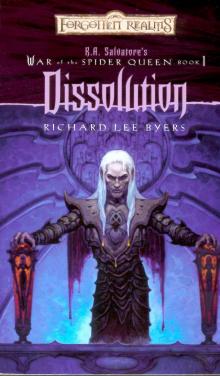 Dissolution
Dissolution Arkham Horror- Ire of the Void
Arkham Horror- Ire of the Void The Haunted Lands: Book II - Undead
The Haunted Lands: Book II - Undead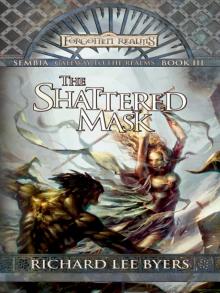 The Shattered Mask
The Shattered Mask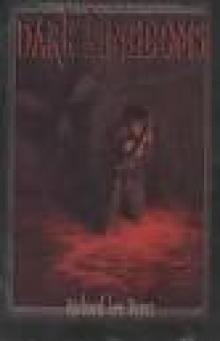 Dark Kingdoms
Dark Kingdoms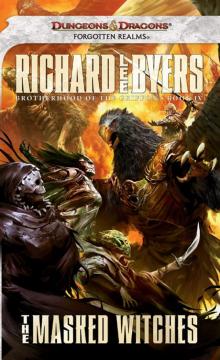 The Masked Witches: Brotherhood of the Griffon, Book IV
The Masked Witches: Brotherhood of the Griffon, Book IV The Plague Knight and Other Stories
The Plague Knight and Other Stories Unclean: The Haunted Lands
Unclean: The Haunted Lands The Captive Flame: Brotherhood of the Griffon • Book 1
The Captive Flame: Brotherhood of the Griffon • Book 1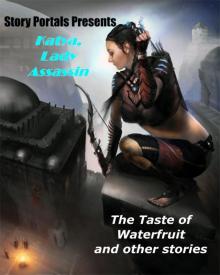 The Taste of Waterfruit and Other Stories (Story Portals)
The Taste of Waterfruit and Other Stories (Story Portals)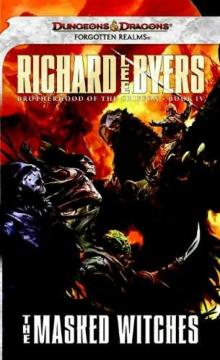 The masked witches botg-4
The masked witches botg-4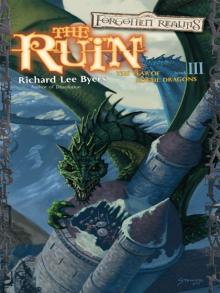 The Ruin
The Ruin The Spectral Blaze botg-3
The Spectral Blaze botg-3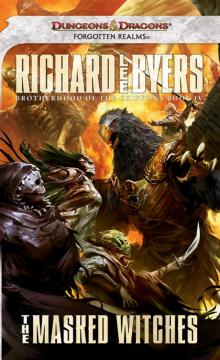 The Masked Witches
The Masked Witches Blind God's bluff bf-1
Blind God's bluff bf-1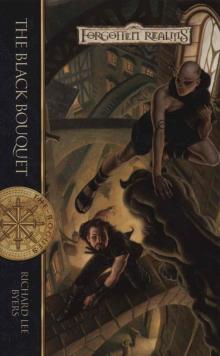 The Black Bouquet r-2
The Black Bouquet r-2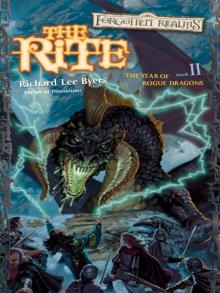 The Rite
The Rite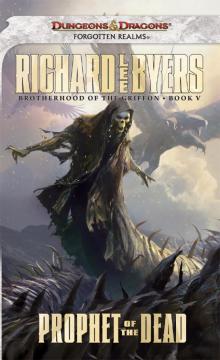 Prophet of the Dead: Forgotten Realms
Prophet of the Dead: Forgotten Realms The Shattered Mask s-3
The Shattered Mask s-3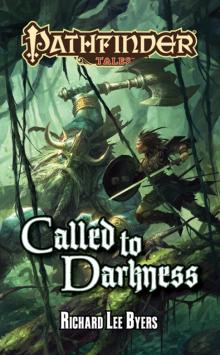 Called to Darkness
Called to Darkness Undead hl-2
Undead hl-2 Blind God's Bluff: A Billy Fox Novel
Blind God's Bluff: A Billy Fox Novel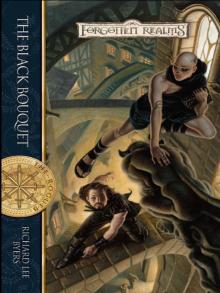 The Black Bouquet
The Black Bouquet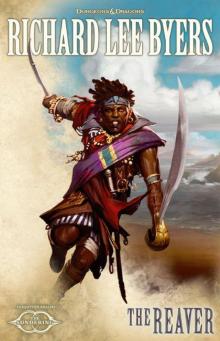 The Reaver
The Reaver The Spectral Blaze: A Forgotten Realms Novel
The Spectral Blaze: A Forgotten Realms Novel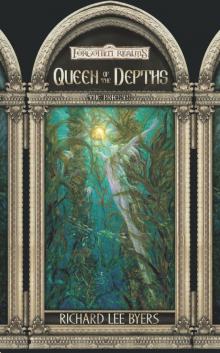 Queen of the Depths
Queen of the Depths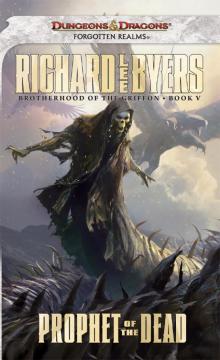 Prophet of the Dead botg-5
Prophet of the Dead botg-5 Whisper of Venom: Brotherhood of the Griffon, Book II
Whisper of Venom: Brotherhood of the Griffon, Book II The Captive Flame botg-1
The Captive Flame botg-1 The Haunted Lands: Book III - Unholy
The Haunted Lands: Book III - Unholy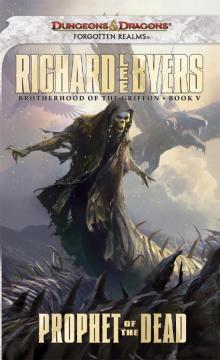 Prophet of the Dead
Prophet of the Dead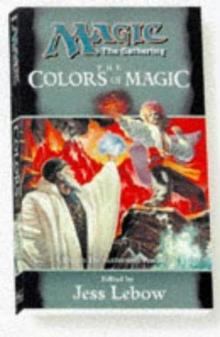 The Colors of Magic Anthology (magic: the gathering)
The Colors of Magic Anthology (magic: the gathering) Unholy hl-3
Unholy hl-3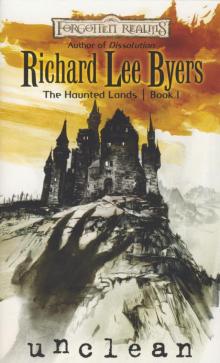 Unclean hl-1
Unclean hl-1 Blind God's Bluff
Blind God's Bluff Whisper of Venom botg-2
Whisper of Venom botg-2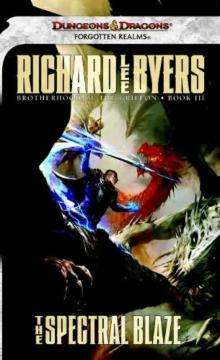 The Spectral Blaze
The Spectral Blaze